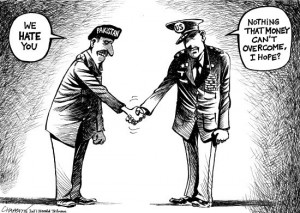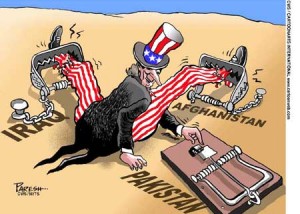It is being intoned like a mantra in Washington these days that Pakistan is an ally the U.S. can’t live with and can’t live without. And all indications are that the same is being intoned in Islamabad about the U.S. as an ally.
 In fact, this is a relationship that is now defined by mutual grievances – with Pakistan complaining that it gets far too little respect and appreciation for all of the sacrifices it makes; and the U.S. complaining that it gets far too little respect and cooperation for all of the cash it doles out.
In fact, this is a relationship that is now defined by mutual grievances – with Pakistan complaining that it gets far too little respect and appreciation for all of the sacrifices it makes; and the U.S. complaining that it gets far too little respect and cooperation for all of the cash it doles out.
These grievances have been highlighted in recent years by Pakistan, on the one hand, accusing the U.S. of willful breaches of its sovereignty with its drone attacks on al Qaeda and Taliban insurgents in the mountainous regions of the country; and the U.S., on the other hand, accusing Pakistan not just of failing to attack these insurgents as promised, but of actually harboring them.
Of course, nothing has incited more mutual outrage in this respect than the recent incursion into Pakistan by U.S. Special Forces that resulted in the killing of Osama bin Laden.
What is instructive though is that, despite Pakistan’s jingoistic defensiveness and the U.S.’s indignant assertiveness, both sides have always been keen to avoid escalating the notorious Sturm und Drang of their relationship to the point of becoming irreconcilable – cautioned on each side no doubt by the aforementioned mantra….
This is why I am convinced that their latest flair up – which was ignited last weekend after NATO (aka U.S.) forces killed 24 Pakistani soldiers – will be weathered in now-customary fashion.
Pakistan claims that the attack is as intolerable as it is inexplicable. It cites the fact that it duly informed the U.S. about the location of the outpost where these soldiers were stationed (ironically to attack the very al Qaeda and Taliban insurgents the U.S. keeps accusing them of not trying hard enough to attack). For its part, the U.S. claims that its fighters were merely retaliating after being fired upon from that outpost. It cites the fog of war….
The point is that each side will have its say – complete with Pakistan engaging in paroxysms of anti-American protests in a plainly feckless attempt to vindicate its sovereignty; and the U.S. expressing regret in a plainly self-serving attempt to boost Pakistan’s emasculated national pride. But when all is said and done, Pakistan will continue, in its begrudging fashion, to do the U.S.’s bidding, and the U.S. will continue, in its damned-if-we-do-damned-if-we-don’t fashion, to bribe Pakistan to do it.
 Ultimately, though, what is most specious about the raison d’etre of this relationship is the U.S.’s claim that it has to tolerate Pakistan’s treachery and ingratitude because Pakistan is an indispensable ally in its war in Afghanistan and, more important, because Pakistan possesses nuclear weapons.
Ultimately, though, what is most specious about the raison d’etre of this relationship is the U.S.’s claim that it has to tolerate Pakistan’s treachery and ingratitude because Pakistan is an indispensable ally in its war in Afghanistan and, more important, because Pakistan possesses nuclear weapons.
It is specious in the first instance because the U.S. has no reason to still be mired down in Afghanistan:
The US legacy there will be distinguished either by a terminally wounded national pride as American forces beat a hasty retreat in defeat (following the Russian precedent in Afghanistan), or by tens of thousands of American soldiers being lost in Afghanistan’s “graveyard of empires” as they continue fighting this unwinnable war (following America’s own precedent in Vietnam) … And more troops only mean more sitting ducks for Taliban fighters.
Not to mention the prevailing fallacy that America must wage war in Afghanistan because it (still) constitutes the central front in the war against al Qaeda. After all, for the past six years the Bush administration prosecuted the war in Iraq as if it were the central front in this war.
Moreover, there’s no denying that the last vestiges of al Qaeda are now so splintered that they are just as likely to be found in Somalia, Pakistan or, indeed, the United States, which makes the strategy for taking them on in Afghanistan patently misguided.
Therefore, Obama would be well-advised to cut America’s losses and run ASAP; to let the Afghans govern themselves however they like; and to rely on Special Forces and aerial drones to “disrupt and dismantle” Taliban and al Qaeda operations there.
(Without (or even with) more forces, failure in Afghanistan is likely, The iPINIONS Journal, September 23, 2009)
It is specious in the second instance because all one has to do is cite the enmity that exists between the U.S. and North Korea to pooh-pooh the notion that the U.S. has to have an alliance with Pakistan to ensure that its nukes do not fall into the hands of terrorists. Not to mention the instructive precedent set by the MAD (mutually assured destruction) relationship it had with the Soviet Union during the Cold War.
Indeed, what is mad about this purported Pakistan dilemma is that the U.S. is incurring the burdens of a relationship that should be borne by India (and to a lesser degree by China and Russia). This not a dilemma; it’s sheer folly.
Related commentaries:
Killing of Osama bin Laden
Without (or even with) more forces…
Obama’s withdrawal plan…